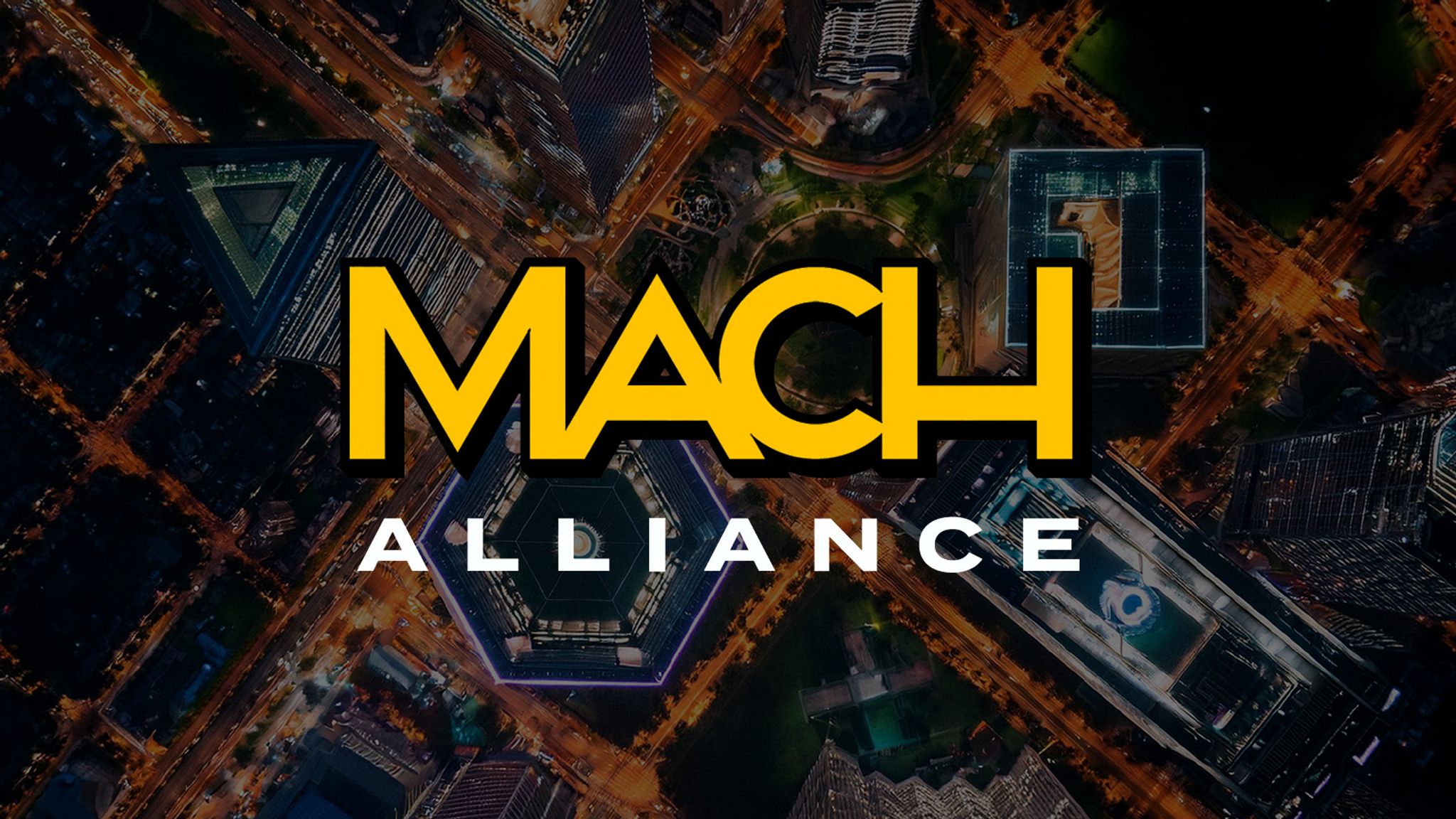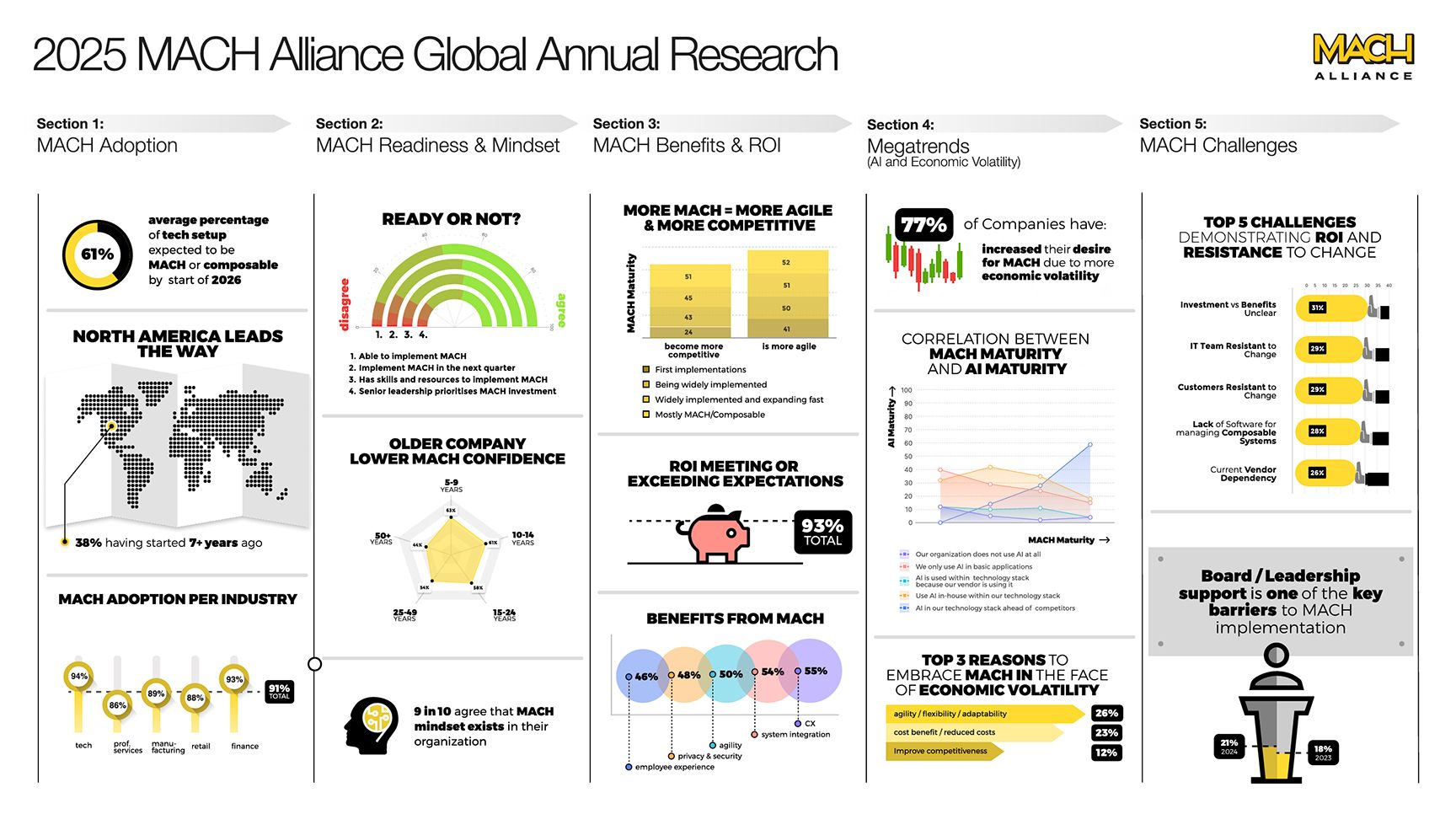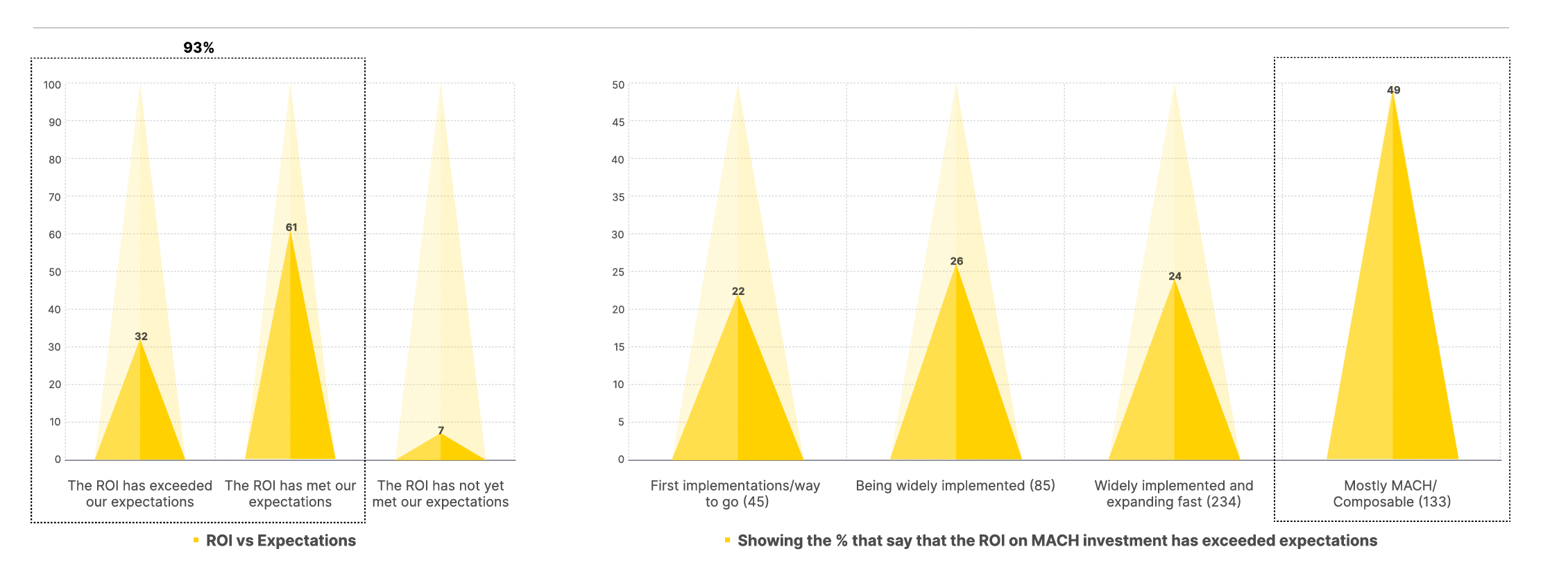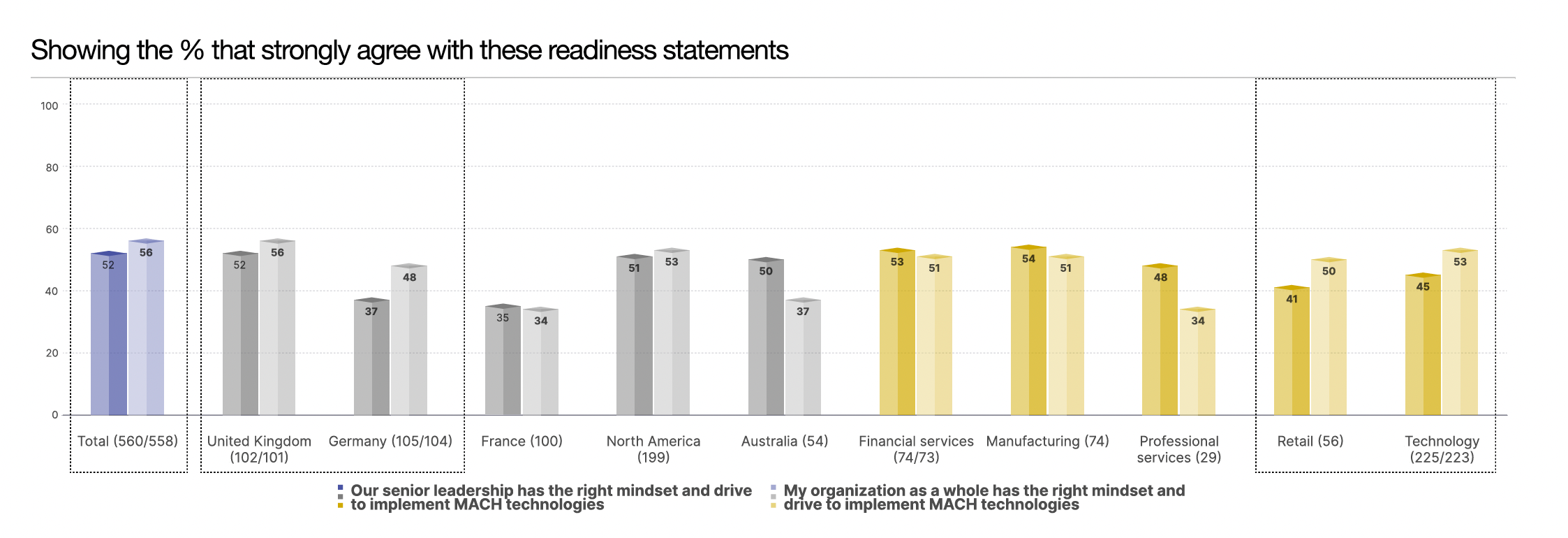Hungry for Composable? New Research Shows a Growing Appetite for MACH Technologies

The MACH Alliance’s 2025 Global Annual Research reveals that 87% of organizations have widely implemented MACH technologies, and nine in ten report meeting or exceeding ROI.
Welcome to 2025! I hope you brought your appetite – because there's already a lot on our collective plate.
As the world spins wildly in the wake of a “new” American president (and an avalanche of policies that will significantly impact trade, tech, and the broader economy), enterprises are struggling to read the tea leaves.
On one hand, the outlook is bullish. According to The Atlanta Fed's GDP Now tool, which incorporates real-time data to project economic growth, the U.S. economy grew at a 3.3% annualized pace in Q4 of 2024. This bodes well for many sectors, with manufacturing positioned as a bright spot.
Meanwhile, with tariffs looming and the geopolitical landscape uncertain, organizations are looking for more ways to hedge their bets by reducing costs and streamlining operations.
Enter composable. Once again, it’s proving to be a transformational architectural approach for many enterprises as they seek to futureproof their stacks and evolve their digital experiences across channels.
But can it really impact growth and deliver ROI?
And then there's the ongoing challenge of decrypting what “composable” means to the market. In the content and DX category, legacy vendors and newer headless players are muddying the water as both sides expand their charters to capture market share. Monolithic DXPs have modularized their offerings with SaaS and more, while a new breed of “composable DXP” aims to redefine the digital experience platform.
This is where the MACH Alliance continues to prove its value, telegraphing a pure view of composability as the cornerstone of its vision for open, best-of-breed technology ecosystems. For the last four years, we’ve covered a steady stream of research and reporting from the Alliance, including a study released last March illustrating how proven ROI on MACH investments is garnering support from leadership and growing MACH adoption.
From the beginning, growth has been a persistent theme across the MACHsphere – and based on the NPO's fifth annual global survey of IT decision-makers, that trend is far from slowing down. Published last week, the 2025 Global Annual Research report found that nine in ten organizations (93% to be exact) that have implemented some level of MACH technology said they have met or even exceeded their ROI expectations.
If you do the math, that’s a seven percent increase from last year’s findings – compelling evidence that MACH and composable technologies continue to gain ground and generate strong results for enterprises. Leading the charge is the North American market, which continues to be a focus for MACH vendors given its addressable size and still-nascent embracing of composable solutions.
“As stewards for the global digital business and brand community that aspires to transform to an open and composable digital ecosystem, the insights and outcomes of the MACH Alliance’s Global Annual Research aim to promote clarity and transparency about the considerations that are top of mind for technology leaders,” said Casper Rasmussen, president, MACH Alliance. “The findings highlight the most important trends that are driving the global digital landscape that we hope will inspire fruitful conversations on the benefits and considerations of MACH adoption.”
Hungry for more? I’ve broken down a few of the tastiest takeaways.
Continued growth and adoption of MACH
Announced at a special event that coincided with NRF 2025: Retail’s Big Show in New York City, the 60-page report is a tour-du-force of data, surveying hundreds of IT decision-makers across a multitude of global geographies.
You can download the full report in PDF for free, but fair warning: it's a deep and highly detailed read, so pick a comfortable armchair. If you're interested in the highlights, the MACH Alliance also offers a "Quick Guide" companion that provides concise, straightforward insights from the complete survey. It's a nice ride-along if you're looking for high-level themes and conclusions.
There's also a handy infographic that distills everything into a visual experience:

Let's get into it: One of the biggest revelations is that 87% of the surveyed organizations have widely implemented MACH technologies. This reflects a broad and growing adoption of the MACH approach across industries – including retail, financial services, and healthcare.
As I’ve already stated, global economics continues to be in a state of flux. To that end, the data around MACH and composable seems to codify its propensity for futureproofing. Only nine percent of respondents said their goals for embracing composable technology decreased due to economic volatility, while 91% of IT leaders reported an increasing motivation to adopt MACH – regardless of the current economic climate. That says a lot about the general sentiment as business leaders look to invest in the right technology strategies.
The research covers key areas around MACH implementation and maturity, adoption trends, and even an organization’s “MACH readiness mindset.” There’s also a portion of the research that zeroes in on the benefits of MACH and how organizations are tapping those outcomes – things like improved CX, more time for innovation, and a notable reduction in IT costs.

Source: 2025 MACH Alliance Global Annual Research
MACH is also translating into greater competitive agility, stimulated by enhanced innovation and experimentation. Bolstered by a composable posture, organizations are meeting customer expectations with greater efficacy, and that’s likely translating into accelerated time-to-market and growth.
The report also suggests that organizations further along in their MACH implementation are tapping even greater competitive potential. Of those organizations that defined themselves as having a mostly MACH/composable infrastructure, 51% have become more competitive, and 52% report that their organization is able to adapt more quickly to change. These attributes translate into greater overall confidence as enterprises go head to head in a faster and more fragmented market – one where disruption is a frequent reality.
Achieving the elusive ROI
For every business embarking on the MACH path, ROI is the brass ring. From the beginning, as enterprises considered this shift from monolithic systems to composable architectures, the question has persisted: is it financially worth it?
According to this year’s research, the juice is indeed worth the squeeze. For respondents that have a mostly MACH/composable infrastructure and are actively measuring ROI, 49% say that they’re exceeding their expectations, suggesting that greater implementation of MACH is proving to be cost-effective.

Source: 2025 MACH Alliance Global Annual Research
Money talks. And when it does, leadership listens. To that end, the report’s data reinforce that MACH success is paying off from a perception level and that respondents (again, those pivotal IT decision-makers) see it playing a key role in the long-term success of their organizations.
Despite this seemingly unchallenged growth trend, barriers to adoption still remain. As the research indicates, a lack of board or leadership support – as well as IT teams that are resistant to change – present the greatest impediments to MACH adoption.
Built for the future of AI
The report’s conclusion focuses on several key topics, including the broad economic benefits of MACH adoption. However, the pervasiveness of artificial intelligence is also a critical consideration.
Even as Europe wrestles with its own policy landscape, the U.S. is on the cusp of eliminating any proposed regulatory red tape. Despite the uneven tapestry, AI will continue its unabated march forward, and we can expect more high-utility applications in 2025.
At the recent Boye & Company CMS Kickoff Conference, the topic was front and center in every presentation and breakout session, reflecting the urgency, demand, and concern as enterprises look to leverage AI's capabilities to achieve differentiated value in the market.
The best way to achieve that value might lie with composable technology. According to the MACH Alliance's research, organizations with composable infrastructures are more likely to be at the forefront of AI technology. This makes sense given that MACH maturity may reflect a more progressive posture, where IT teams are implementing cutting-edge AI technologies with a wide range of connected services.
To attain this data, respondents were asked about the composition of AI in their organization’s stack, and whether it is utilizing tools like ChatGPT or Microsoft Copilot. That might sound like it's scratching the surface, but I've also served on panels where large organizations have admitted their own struggles when executing even a basic AI strategy. Tracking the growth with these more elemental generative technologies (Google, Microsoft, and even OpenAI are practically the dinosaurs in the mix) demonstrates a growing maturity – and that's a key signal.

Source: 2025 MACH Alliance Global Annual Research
While most enterprises are embracing AI on some level, those on the MACH spectrum may have an inherent advantage when accessing advanced cloud technologies and services that enable faster experimentation, training, and implementation. For example, forward-thinking organizations might experiment with open model training on Hugging Face rather than just relying on OpenAI connectors.
A note on methodology
The MACH Alliance’s fifth annual survey was developed and delivered in January of 2025, but prepared in November of last year. The study was commissioned by the MACH Alliance and executed by M·E·L Research.
Responses were collected from 561 IT decision-makers at the director level and above. Participants represented companies with at least 5,000 employees and $500 million in annual revenue. Companies were based in the United States, UK, Germany, France, Canada, and Australia; this year, Canada and Australia were added to expand global representation.
Why it matters
Self-generated research is always a bit challenging. There’s always some modicum of bias to parse, but the MACH Alliance has been transparent about its methodology and has consistently leaned on third-party sources to execute. To that end, the data points reveal enough objectivity to draw solid conclusions – particularly that composable is continuing to trend upward.
Perhaps the most compelling metrics orbit the ROI. As the data indicates, it’s likely that the increased positivity toward MACH is, at least in part, being driven by a larger portion of organizations finally attaining a calculable return on their investment.
In my conversations with certain brands and agencies – and codified by global enterprises featured at the MACH THREE Conference – the journey to composable is often long and complex (dare I say harrowing). Understanding the complete ROI picture may be hindered by this latency, and seeing more organizations achieve a measurable return is a critical testament, particularly as any “MACHlash” promulgated by failed projects stirs doubt.
One thing that really jumped out for me was the gap around MACH readiness. While composable is being embraced more prevalently, the concept of the “MACH mindset” – a key component for achieving success – is still behind the curve. And based on the data, it’s clear this is still a barrier.
Although 90% of respondents agree that having the right mindset exists in their organization, less than half strongly agree that their leadership and organization have the right mindset to drive and implement MACH.

Source: 2025 MACH Alliance Global Annual Research
Part of what appears to be driving this is age – or, more appropriately, older organizations. The research suggests that while a pattern of positivity exists towards MACH, confidence in the ability to implement MACH appears to be lower for more mature companies.
The persistent challenge of legacy technology was also part of the calculus. This is obviously a very broad area of consideration, but it speaks to the inherent obstacles that monolithic technologies present from a scalability perspective. The more legacy technology an IT department has to maintain, the more time and money that is dedicated to upgrades and maintenance.
This is one of the more pertinent and foundational points in favor of modern MACH architectures. At the same time, leveraging the API-first fabric of a composable framework provides the benefit of bringing legacy technologies along for the ride – especially if there are compelling reasons for maintaining these systems, such as regulatory or compliance requirements.
Despite all of MACH's continued gains and promising benefits, the initial investment is still a drag on adoption. The survey data includes several quotes from respondents that reflect this persistent barrier. From economic uncertainty straining budgets to the sheer justification of the expenditure to leadership, MACH still faces significant headwinds.
That said, I look at this feedback as promising. First, it represents a smaller piece of the overall pie, as most organizations are finding a way to navigate the economic obstacles. But more importantly, this insight clearly demonstrates where the resistance exists – and as more organizations report a significant ROI, these barriers may very well erode.
MACH isn’t for every organization. I’ve always maintained that. Further, its success depends heavily on embracing the right mindset, skills, and resources – not just the technology.
But if you’re hungry for composable, having this annual snapshot is a much-needed snack on the long road to success.
Sink your teeth into this data. It’s well worth a read.
Upcoming Events

CMS Summit 25
May 13-14, 2025 – Frankfurt, Germany
Don't miss the first European edition of our prestigious international conference dedicated to the global content management community! CMS Summit 25 will bring together top-notch speakers, our renowned learning format, and engaging social events. Hear from leading practitioners like Deutsche Bahn, Dr. Oetker, and more – and join customers, agencies, and CMS vendors as we discuss current trends and what's ahead for the content and digital experience fields. Connect and network at the only vendor-neutral, in-person conference focused on CMS. Space is limited for this exclusive event, so book your seats today.

CMS Connect 25
August 5-6, 2025 – Montreal, Canada
We are delighted to present the second annual summer edition of our signature global conference dedicated to the content management community! CMS Connect will be held again in beautiful Montreal, Canada, and feature a unique blend of masterclasses, insightful talks, interactive discussions, impactful learning sessions, and authentic networking opportunities. Join vendors, agencies, and customers from across our industry as we engage and collaborate around the future of content management – and hear from the top thought leaders at the only vendor-neutral, in-person conference exclusively focused on CMS. Space is limited for this event, so book your seats today.